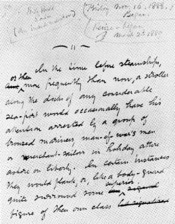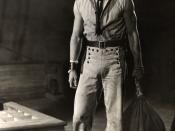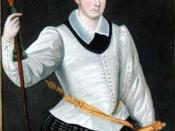One symbolic representation of Billy Budd is Captain Vere's death from a musket ball shot from a porthole. Captain Vere chooses law over emotion in the sentencing of Billy. The musket ball doesn't decide and doesn't favor whom it's going to kill. It's symbolic that the justice which killed Billy is the same justice which killed Vere.
After Billy kills Claggart, Vere is faced with a cross-road. He thinks of Billy like a son. Though Vere sympathizes with Billy, he's pressured to follow the rules of the navy. Mutiny was a popular treason among the navy, and Vere wouldn't let something like that happen on his ship. He's a very strict and orderly commander. In the story he's described as "never tolerating an infraction of discipline." Captain Vere's justice is blind, without emotion. He doesn't show favor to Billy but strictly enforces the laws. He prefers law over emotion.
He view's emotion as a feminine trait, and for him to have that would be unspeakable.
The musket ball kills Vere with significance. It goes by the Law of Motion. The first law of motion states, " that every body's center of mass continues in its state of rest, or of uniform motion in a straight line, unless it is compelled to change that state by forces impressed on it." Emotion can't break that law. Justice shows no preferred persons when executing.
Captain Vere said, "With mankind, forms, measured forms are everything." When he got hit with the musket ball, it suggested that lawlessness had succeeded over law. Irony shows within the story when the French's ship is interpreted as the "Atheist." Perhaps when Vere murmurs Billy's name, he's regretting his decision.
The symbolic interpretation of Captain Vere's death from a musket ball shot from a porthole...


